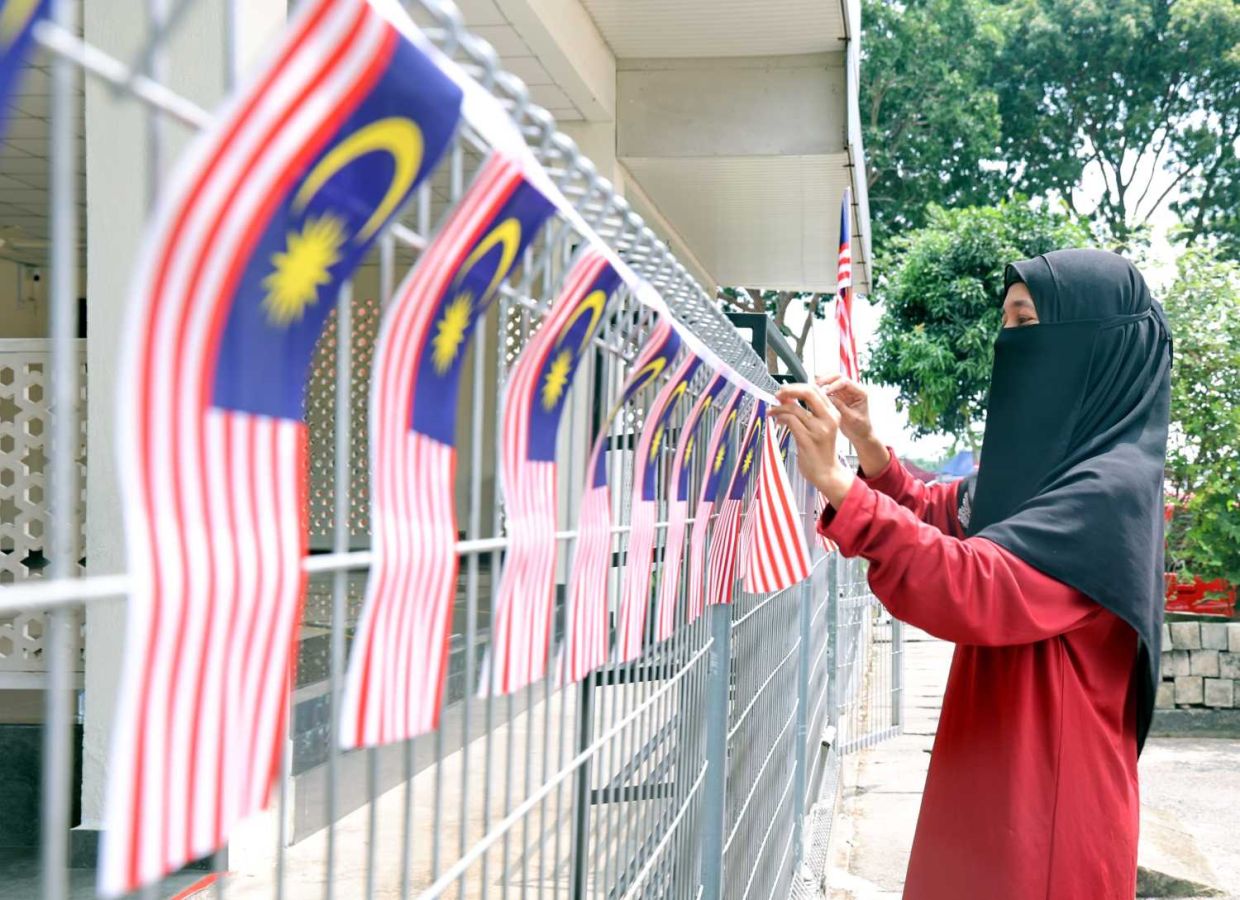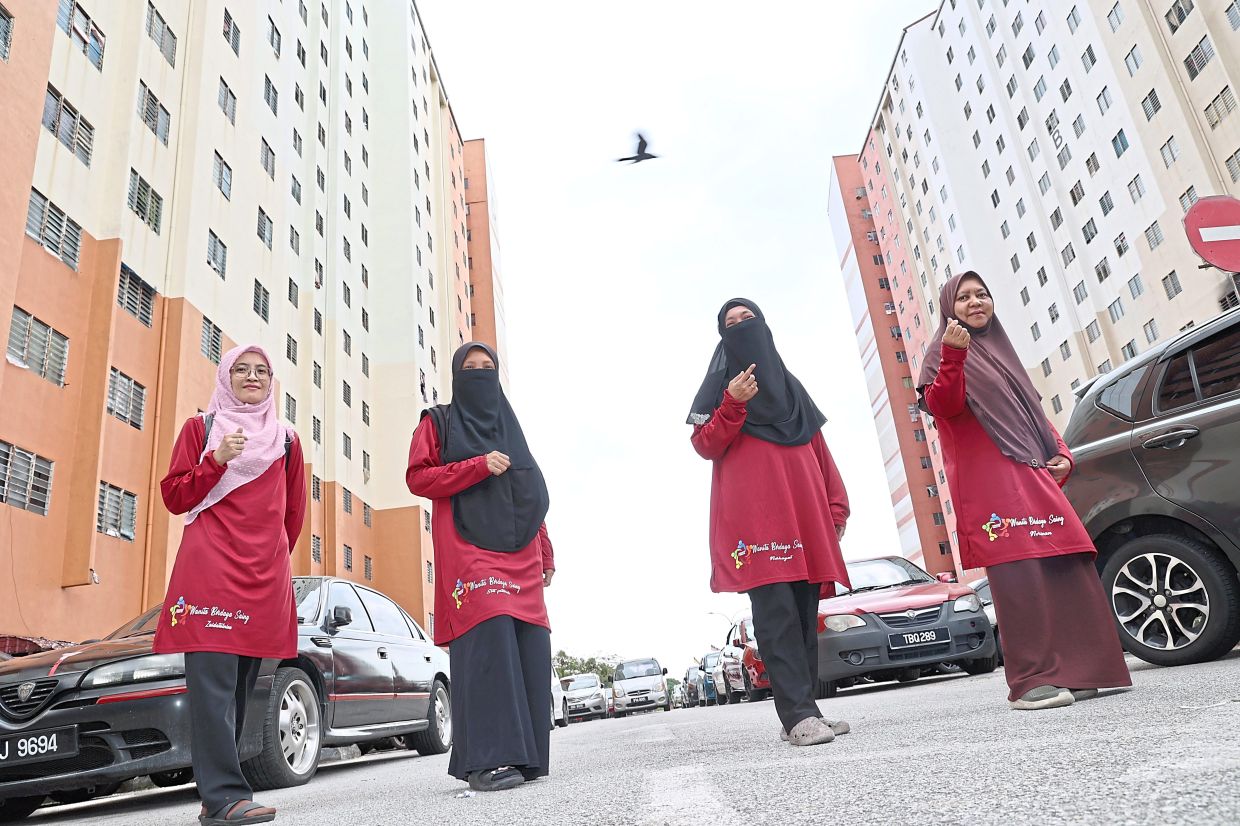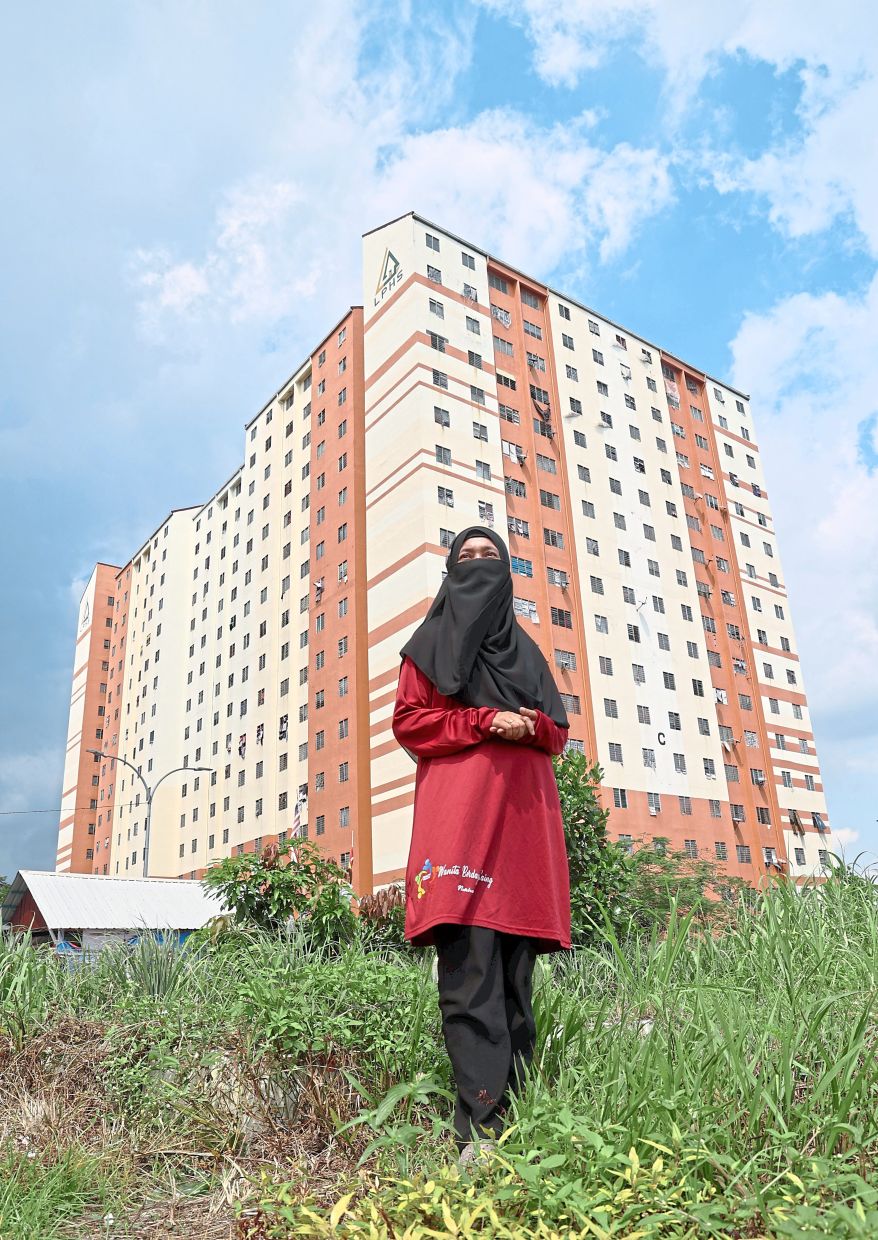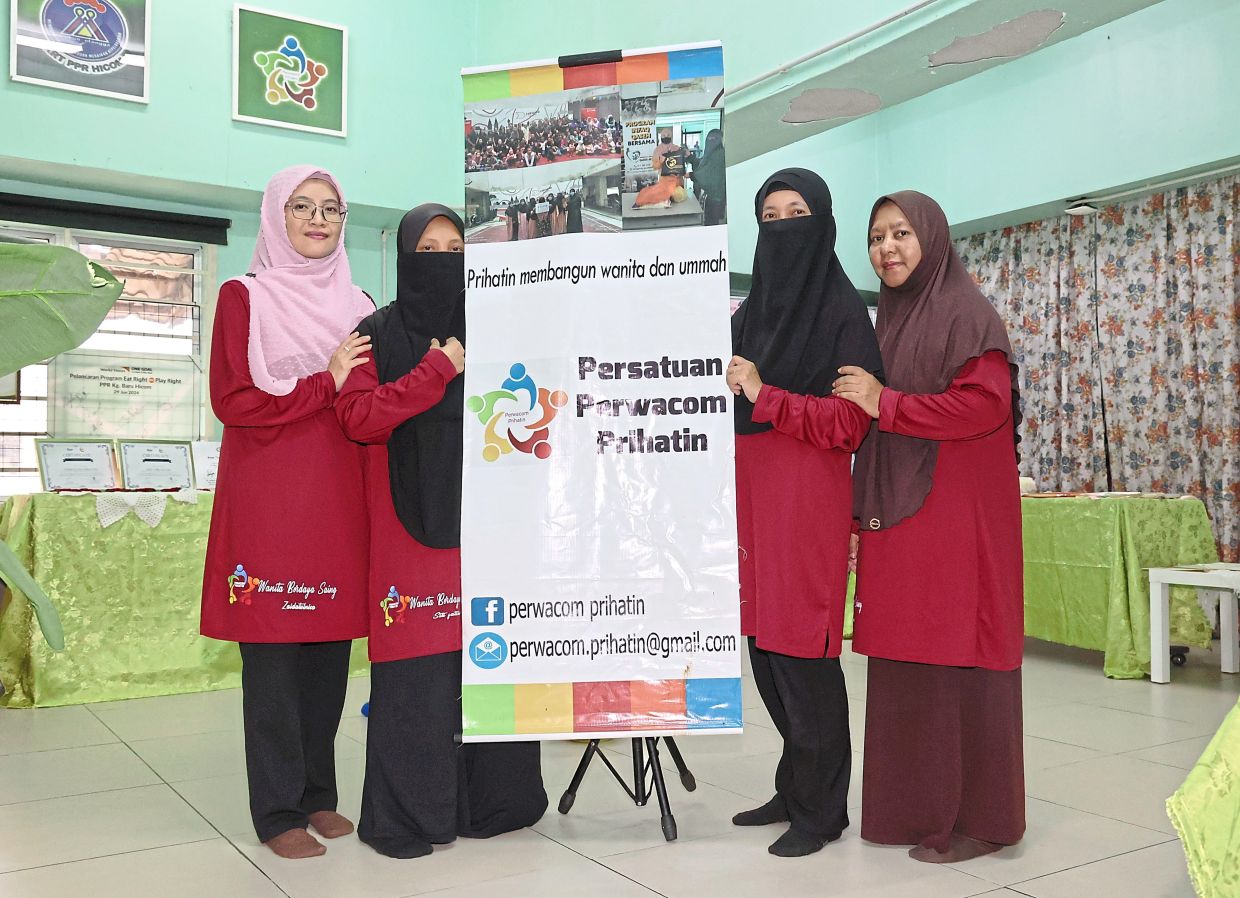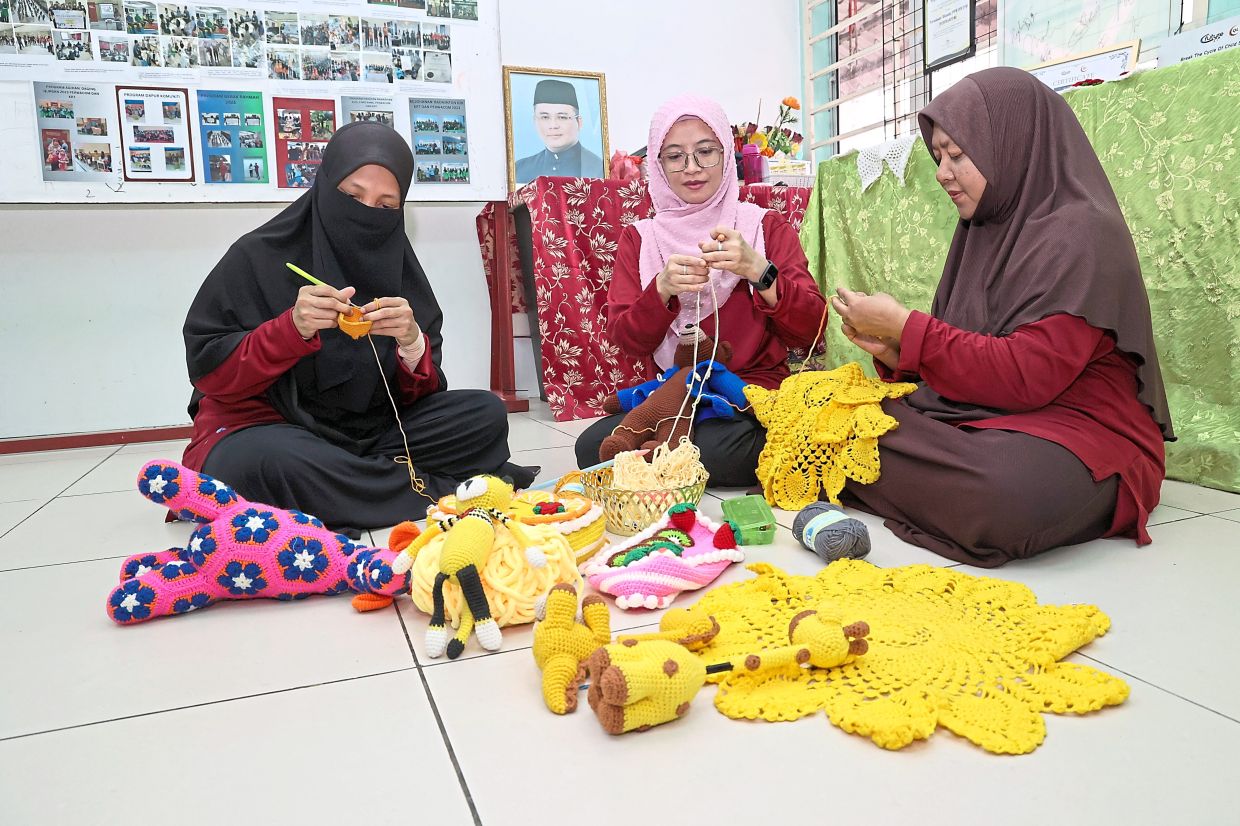We've gone through tragedies and hardships ... but through them all, we've learnt, triumphed and come out stronger, says Noor Hayati. (JUNE 26 2024) — ART CHEN/The Star # Metro Backpages
Siti Fatihah Zaini, 40, has high hopes for her group, the PPR Hicom's Women’s Association (Perwacom), as the country celebrates its 67th National Day tomorrow.
"We hope to bring the spirit of Merdeka to our residents, children and our nation," says Siti Fatihah who is the deputy chairperson.
“This is crucial as we live together in a multicultural society," says the mother of six children, between 18 years and three months old.
Perwacom, a grassroots organisation started by the women residents of the People's Housing Programme (PPR) in Kampung Baru Hicom in 2019, was originally formed to address issues faced by residents. A year later, during the Covid-19 pandemic, it handled issues such as such food access, healthcare and online learning, as well as helped residents reduce stress and difficulties brought on by the health emergency.
Today, it continues to grow from strength to strength, five years after it was officially registered, embodying the spirit of this year’s Merdeka theme, Malaysia Madani: Jiwa Merdeka as the movement strives to improve its residents' livelihoods and empower women and children.
Now, Perwacom has 15 to 20 members and four committee members: Chairperson Norizan Mohd Nor, 52, Siti Fatihah, secretary Noor Hayati Ismail, 47, and treasurer Zaidatulnisa Salleh, 40.
Norizan says one of the reasons the women of PPR Hicom started the association was to help residents who had lost their income during the pandemic.
When companies shut down or halted work during the MCO, many residents who worked at the nearby factories lost their only source of income and couldn't earn a living, she shares.
“We wanted to not just look after our own welfare, but also that of our community,” says the single mother who has six children from the ages of 25 to 11, who earns a living by sending children in the area to, and fetching them from school.
Realising that it would be difficult to get anything done on their own, the women decided to band together under the association to apply for aid from the government and various NGOs.
Before this, Norizan says, nobody knew about PPR Hicom, and aid usually went elsewhere but rarely to them.
Standing on the banks of the Klang River, in front of their apartment building, Noor Hayati points towards an area across the river.
"That's Taman Sri Muda where major floods happened in December 2021. From 7pm on the first day, we already heard cries for help, and even until 4am on the second day, we could still hear their pleas. But sadly, we couldn't reach them because there was no access. We too, were trapped in our homes because of the floodwater, and the only exit to get to the main road was inaccessible due to the flood," she recounts.
"We couldn't go out because the lower floors of the PPR, as well as all the vehicles, were submerged. Our area was like an island, surrounded by water, she adds.
"We've gone through tragedies and hardships – the pandemic, MCO and the Shah Alam flash floods, but through them all, we've learnt, triumphed and came out stronger," Noor Hayati adds, as she takes StarLifestyle on a tour of the premises.
After the Covid-19 pandemic, Perwacom continues its efforts.
"Our mission and focus now is to empower women and children," shares Noor Hayati. "Our community has faced many setbacks and gone through the pandemic and flash floods, but we're ready to rise again."
"During the pandemic, many of us were affected – people lost their jobs, had to take on different types of work, lost loved ones and family. Then, when we were hit by the floods, we lost our property – cars, motorbikes, and other vehicles; homes, furniture and appliances.
To help these families, Perwacom offers upskilling opportunities for the women and collaborates with programmes such as Teach for Malaysia and Impian Kencana for the children.
The children's programmes, Noor Hayati says, are designed to motivate the young ones to not give up despite the hardships they have faced or are facing, and equip them with new skills.
"Our focus isn't just on formal education, but also informal learning. We look at the physical and mental well-being of our children too.
"We've implemented external programmes such as World Vision's One Goal Malaysia, a movement to empower urban poor children in Malaysia to eat right, play right and live right by leveraging on their love of sports," she says.
This is Perwacom's second year in this programme and its focus is badminton.
PPR Hicom is one of the few PPRs that has a badminton court in its compound and Perwacom organises tournaments in the PPR community for young people to learn about sportsmanship.
"Last year, we had a tournament with PPR Kota Damansara and PPR Lembah Subang. Who knows, in future, perhaps a Malaysian badminton champion may come from the PPR community," she adds.
In the association hall, many certificates are displayed, a testament to the PPR Hicom community's capabilities.
There are also samples of products the women have made including beadings on shoes, embellishments on clothes, knitted pieces, crocheted items like amigurumi toys and decorations.
But the women aren't just skilled workers. They hope to transfer the skills they've learnt to their community at PPR Hicom, as well as other PPR communities such as Perumahan Awam (PA) Sri Selangor and Sri Sarawak in Kuala Lumpur.
The group also applied for the Kita Untuk Kita (K2K) grant to fund its women empowerment project in sewing, cooking and baking. The funds were used to purchase equipment and appliances for their small enterprises so these women could earn an income.
“For example, a sewing machine costs RM7,000 and we can't afford it, but we've applied through the grant to purchase it and it's placed here at the community centre for use,” says Noor Hayati, adding that last year, Prime Minister Datuk Seri Anwar Ibrahim visited PPR Hicom and announced additional funding of RM35mil for PPRs in KL and Selangor, and the grants – some of which are pending approval – are from this allocation.
The K2K programme was launched by Selangor Menteri Besar Datuk Seri Amirudin Shari in 2021. The government worked together with Think City to help improve the lives of people living in the PPR and the pilot project was at PPR Hicom.
Thanks to K2K, Perwacom has implemented several projects. Among them is Program Remaja Cemerlang, a course for youth from the ages of 13 to 17 to motivate them to pursue their goals and fulfil their purpose in life.
Zaidatulnisa believes that empowering the next generation is important.
“People often see children from PPR communities as not smart, always loafing around and delinquents, but that couldn’t be further from the truth. Our children have the potential to be just as successful as children from affluent communities. We’ve had children from the PPR attend youth conferences and participate in debates. Whenever there are activities, they’re always at the forefront,” says the mother of three children aged between 16 and one.
Next to the association hall is the Homework Club, an initiative led by Adab Youth Garage’s Youth Leaders Club (YLC) Hicom and comprises youth from the ages of 13 to 17.
Here, children are taught effective learning techniques. They are given tips on how to do homework, study, prepare for their exams and do well in them. This is different from school, which focuses on the formal syllabus.
“This was done at the request of the students themselves; it wasn’t imposed on them by the adults. As parents, it's encouraging to see our children wanting to learn and taking the initiative to apply for the grant and having their classes here,” she says.
“For now, they have classes on learning techniques for three subjects: Bahasa Malaysia, History and Mathematics, from Form One to Five. They focus on one subject per month, with lower secondary on Saturdays, and upper secondary on Sundays," Zaidatulnisa says.
"They also have what we call Happy Hour which is experiential learning where the youth explore the world around them, such as going on a trip like to the museum," she adds.
Noor Hayati adds that last year was a proud moment for them when one of the residents' child – Maizatulakma Lisa Aqilah Abdullah – was selected to participate in Teach for Malaysia's Kids Education Revolution Programme in Mumbai, India.
"There were four youths from Malaysia including from PPR Hicom and they had to take part in a parliamentary style debate with other participants who were college students, teachers and lecturers," she says.
Then there is the Cooking Project where five participants from PPR Hicom were sent to learn from Akademi Memasak Chef Liza, of reality TV show MasterChef Malaysia.
"After they've taken a course in confectionary and catering, they are certified and can then teach others in the community what they have learnt," says Noor Hayati.
Training is also provided through the Human Resource Development Council (HRDC). One of its programmes is Program Latihan Madani which empowers Malaysia's underserved communities through learning and development.
It runs programmes on food safety and quality, and the certification is recognised by the Health Ministry, she says.
Women residents can also take digital marketing courses that teach them how to market the products they make, be it food or handicrafts.
Perwacom's latest project is Projek Keceriaan which is a long-term effort to beautify and enhance the PPR Hicom flats. The purpose is to strengthen community ties, build cooperation and communication among the residents since they have to work together on the project.
It's a floor-by-floor project for all three blocks.
"Often, even though people live in the same building, they don't know each other. They don't even talk to their neighbours on the same floor. This project encourages them to come out and get to know their neighbours," says Noor Hayati.
"They have to clean the corridors together, repaint the walls, meet and discuss how to beautify and decorate the area, so they will get to know each other," she adds.
“We want to be a role model and a good example to be emulated by other PPRs, and to educate Malaysian society about the PPR community,” says Siti Fatihah.
“People often have negative perceptions that those who live in PPR flats are lazy, dirty, uneducated and poor, and that children living in PPR flats have bleak future," says Siti Fatihah.
"We want to remove this stigma, and change the mindset of people out there; PPR residents can be successful like any other community. We hope to be seen as a community with a vision,” she concludes.










